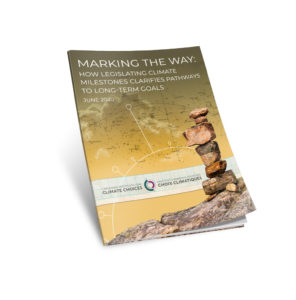Yet our analysis also underscores that—no matter how valuable—climate accountability frameworks are not a silver bullet for achieving ambitious climate objectives.
Even in jurisdictions with the most stringent implementation, government accountability drivers are largely restricted to reputational and political consequences. Transparent monitoring and reporting help
citizens and stakeholders hold governments to account. But climate accountability legislation cannot bind future democratically elected governments to the policy choices of previous governments. Whether future governments uphold existing milestones and the policies for meeting them is ultimately up to them, since policy advice can be rejected, and even binding legislation can be repealed. This inherently limits the certainty that climate accountability legislation can provide around future policy and emissions reductions.
Further, climate accountability legislation cannot fundamentally resolve the difficulties associated with climate policy-making in a decentralized federation. For Canada to have a robust and effective response to climate change, a wide range of policy levers must be brought to bear. But a climate accountability framework cannot force provinces, territories, Indigenous governments, or municipalities to implement stringent policy. The federal government can only encourage them to act. No matter how it is implemented, a Canadian climate accountability framework will inevitably have to contend with complex intergovernmental policy coordination challenges and, at times, diverging priorities across various orders of government.
Nevertheless, a climate accountability framework can play a powerful role in keeping governments on track to meet their long-term targets. When targets are enshrined in law, a climate accountability framework provides an important legal foundation for what can otherwise be purely aspirational goals. Interim milestones signal to households, businesses, and investors the level of climate policy stringency they can expect in the medium term with greater certainty. The independent advice and analysis provided by an expert advisory group makes the available choices clearer and supports evidence-based policy-making. Accessible reporting allows citizens and stakeholders to monitor and track progress. And the forum the framework establishes for considering long-term implications, coordinating climate policies, and reconciling tensions and trade-offs helps support the political durability of climate policy.
A climate accountability framework cannot circumvent difficult policy debates and policy coordination challenges in Canada, but it can enable better policy by providing a process for addressing intergovernmental challenges.
It can create the conditions and institutional frameworks for governments to coordinate and collaborate increasingly over time. The repeating—and transparent—cycle of policy development, progress checks, and (where necessary) course correction can create pressure among all orders of government to implement policy consistent with each other and with national targets. A collaborative federal government could create incentives for active participation. And provinces, territories, Indigenous governments, and municipalities could exert their influence by tailoring policy according to local context and putting pressure on other governments by implementing more ambitious policy.
Climate accountability frameworks can also, over time, help avoid potential pendulum swings in policy ambition when new governments are elected. As the case studies illustrate, climate accountability frameworks do not lock in policy nor prevent future governments from adjusting their approach in the future. This flexibility creates space for future governments to make climate policy their own. While it undercuts policy certainty, it increases the odds that a future government will choose to work within the climate accountability framework rather than do away with it entirely.
Over time, this process can become foundational to the climate policy landscape in Canada. Its transparent monitoring and reporting requirements will empower citizens and stakeholders to better understand how meaningful their governments’ climate policies are. Over time, improved accountability could help drive a convergence in climate policy ambition across a range of perspectives.
By increasing transparency and accountability, and by formalizing institutional structures and governance processes, climate accountability frameworks can serve as a crucial step toward Canadian governments implementing coordinated, effective climate policies consistent with the country’s long-term targets.
